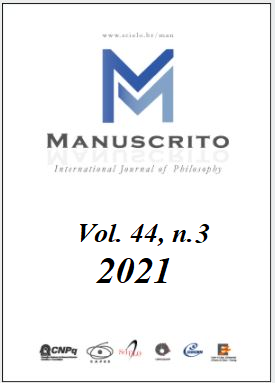Resumo
In his logical foundation of arithmetic, Frege faced the problem that the semantic interpretation of his system does not determine the reference of the abstract terms completely. The contextual definition of number, for instance, does not decide whether the number 5 is identical to Julius Caesar. In a late writing, Quine claimed that the indeterminacy of reference established by Frege’s Caesar problem is a special case of the indeterminacy established by his proxy-function argument. The present paper aims to show that Frege’s Caesar problem does not really support the conclusions that Quine draws from the proxy-function argument. On the contrary, it reveals that Quine’s argument is a non sequitur: it does not establish that there are alternative interpretations of our terms that are equally correct, but only that these terms are ambiguous. The latter kind of referential indeterminacy implies that almost all sentences of our overall theory of the world are either false or neither true nor false, because they contain definite descriptions whose uniqueness presupposition is not fulfilled. The proxy-function argument must therefore be regarded as a reductio ad absurdum of Quine’s behaviorist premise that the reference of terms is determined only by our linguistic behavior.
Referências
Benacerraf, Paul 1965, ‘What Numbers Could Not Be’, Philosophical Review 74, pp. 47-73.
Benacerraf, Paul 1981, ‘Frege: The Last Logicist’, Midwest Studies in Philosophy VI, Minneapolis. Reprinted in: W. Demopoulos (Ed.), Frege’s Philosophy of Mathematics, Cambridge, M.: Harvard University Press, pp. 41-67.
Bentzen, Bruno 2019, ‘Frege on Referentiality and Julius Caesar in Grundgesetze Section 10’, Notre Dame Journal of Formal Logic 60, pp. 617-637.
Davidson, Donald 1990. Meaning, Truth and Evidence, in Perspectives on Quine, ed. R. B. Barrett and R. F. Gibson, Oxford: Blackwell: 68-79.
Dummett, Michael 1981, The Interpretation of Frege's Philosophy, Cambridge/M., Harvard University Press.
Dummett, Michael 1991, Frege. Philosophy of Mathematics, Cambridge/M., Harvard University Press .
Frege, Gottlob 1884, Die Grundlagen der Arithmetik. Eine logisch mathematische Untersuchung über den Begriff der Zahl, Breslau, 1884. Translated as The Foundations of Arithmetic. A Logico-Mathematical Enquiry into the Concept of Number. Second edition, Oxford: Blackwell , 1953.
Frege, Gottlob 1893 & 1903, Grundgesetze der Arithmetik, Jena, vol. I, 1893, and vol. II, 1903. Transl. as Basic Laws of Arithmetic. Transl. and ed. by Ph. A. Ebert & M. Rossberg, Oxford: Oxford University Press, 2013.
Frege, Gottlob 1997, The Frege Reader, ed. by Michael Beaney, Oxford: Blackwell .
Gibson, Roger 1982, The Philosophy of W.V.O. Quine. An Expository Essay, University of South Florida Press, Tampa.
Gibson, Roger 1988, Enlightened Empiricism, University of South Florida Press, Tampa .
Greimann, Dirk 2003, ‘What is Frege’s Julius-Caesar Problem?’, Dialectica 57, pp. 261-278.
Greimann, Dirk 2014, ‘A Tension in Quine’s Naturalistic Ontology of Semantics’, Grazer Philosophische Studien 89, p. 113-130.
Greimann, Dirk 2021, ‘Ontological Indifference of Theories and Semantic Primacy of Sentences’, Kriterion, published online https://doi.org/10.1515/krt-2021-0014, pp. 1-24.
Gregory, Paul 2019, ‘Quine’s Ding an sich: Proxies, Structure, and Naturalism’, in: Sinclair 2019, pp. 137-156.
Heck, Richard 2005, ‘Julius Caesar and Basic Law V’, Dialectica 59, pp. 161-178.
Heck, Richard 2011, Frege’s Theorem, Oxford, Oxford University Press.
Heck, Richard 2012, Reading Frege’s Grundgesetze, Oxford, Oxford University Press .
Hylton, Peter 2000, ‘Reference, Ontological Relativity, and Realism’, Aristotelian Society Supplementary 74, pp. 281-299.
Hylton, Peter 2004, ‘Quine on Reference and Ontology’, in: R. Gibson (Ed.), The Cambridge Companion to Quine, Cambridge, Cambridge University Press, pp. 115-150.
Hylton, Peter 2007. Quine, London and New York: Routledge.
Janssen-Lauret, Frederique 2019, ‘Quine, Ontology, and Physicalism’, in: R. Sinclair 2019, pp. 181-204.
Quine, W.V.O. 1948, ‘On What There Is’, in: W.V.O. Quine, From a Logical Point of View, New York: Harper and Row. First published by Harvard University Press in 1953, with a second, revised edition on 1961, pp. 1-19.
Quine, W.V.O. 1960, Word and Object, Cambridge/M., The M.I.T. Press.
Quine, W.V.O. 1964, ‘Ontological Reductions and the World of Numbers’, Journal of Philosophy 61, pp. 209-216.
Quine, W.V.O. 1968a, ‘Ontological Relativity’, reprinted in: W.V.O. Quine, Ontological Relativity and Other Essays, New York, Columbia University Press, 1969, pp. 26-68.
Quine, Willard van Orman 1968b. ‘Epistemology Naturalized’, reprinted in: W.V.O. Quine, Ontological Relativity and Other Essays, New York, Columbia University Press, 1969, pp. 69-90.
Quine, W.V.O. 1973. The Roots of Reference, La Salle: Open Court.
Quine, W.V.O. 1976, ‘Whither Physical Objects?’, in: R. Cohen (Ed.), Essays in Memory of Imre Lakatos, Dordrecht: Reidel: pp. 487-504.
Quine, W.V.O. 1981, ‘Things and Their Place in Theories’, reprinted in: W.V.O. Quine Theories and Things, Cambridge/M., Harvard University Press , 1981, pp. 1-23.
Quine, W.V.O. 1983, ‘Ontology and Ideology Revisited’, Journal of Philosophy 80, pp. 499-502.
Quine, W.V.O. 1984, ‘Relativism and Absolutism’, Monist 67, pp. 293-296.
Quine, W.V.O. 1986, ‘Reply to Roger F. Gibson’, in: L. Hahn & P. Schilpp (Eds.), The Philosophy of W.V. Quine, La Salle, Open Court, 1986, pp. 155-157.
Quine, W.V.O. 1990, Pursuit of Truth, Cambridge/M., Harvard University Press , revised edition, 1992.
Quine, W.V.O. 1990a. ‘Three Indeterminacies’, in Perspectives on Quine, ed. R. B. Barrett and R. F. Gibson, Oxford: Blackwell : 1-16.
Quine, W.V.O. 1992, ‘Structure and Nature’, Journal of Philosophy 89, pp. 5-9.
Quine, W.V.O. 1995, ‘Naturalism; or Living Within One's Means’, Dialectica 49, pp. 251-261.
Quine, W.V.O. 2019, ‘The Lectures’, in: Sinclair, Robert (Ed.), Science and Sensibilia by W. V. Quine. The 1980 Immanuel Kant Lectures, Cham: Palgrave Macmillan, part I.
Salmón, Nathan 2018, ‘Julius Caesar and the Numbers’, Philosophical Studies 175, pp. 1631-1660.
Schirn, Matthias 1996, ‘Introduction: Frege on the Foundations of Arithmetic and Geometry’, in: M. Schirn (Ed.), Frege: Importance and Legacy, Berlin, de Gruyter, 1996, pp. 1-42.
Weiner, Joan 1995: ‘Realism Bei Frege: Reply to Burge’, Synthese 102, pp. 363-382.
Wright, Crispin 1983, Frege’s Conception of Numbers as Objects, Aberdeen: Aberdeen University Press.
Wright, Crispin & Hale, Bob 2001, ‘To Bury Caesar’, in: Wright & Hale (Eds.), The Reason's Proper Study: Essays Towards a Neo-Fregean Philosophy of Mathematics, Oxford, Clarendon Press, 2001, pp. 335-396.

Este trabalho está licenciado sob uma licença Creative Commons Attribution 4.0 International License.
Copyright (c) 2021 Dirk Greimann


